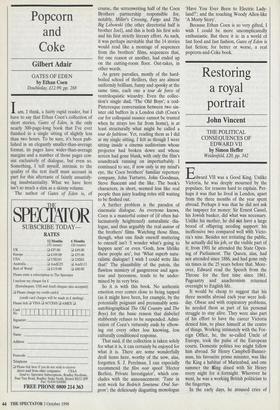Popcorn and Coke
Gilbert Adair
GATES OF EDEN by Ethan Coen Doubleday, £12.99, pp. 288 Iam, I think, a fairly rapid reader, but I have to say that Ethan Coen's collection of short stories, Gates of Eden, is the only nearly 300-page-long book that I've ever finished in a single sitting of slightly less than two hours. To be sure, it's been pub- lished in an elegantly smaller-than-average format, its pages have wider-than-average margins and a number of those pages con- sist exclusively of dialogue, but even so. Something, I tell myself, intrinsic to the quality of the text itself must account in part for this aftertaste of faintly unsatisfy- ing insubstantiality. What we have here isn't so much a slim as a skinny volume.
The author of Gates of Eden is, of course, the screenwriting half of the Coen Brothers partnership responsible for, notably, Miller's Crossing, Fargo and The Big Lebowski (the other directorial half is brother Joel), and this is both his first solo and his first strictly literary effort. As such, it was perhaps inevitable that the 14 stories would read like a montage of sequences from the brothers' films, sequences that, for one reason or another, had ended up on the cutting-room floor. Out-takes, in other words.
As genre parodies, mostly of the hard- boiled school of thrillers, they are almost uniformly brilliant, funny and spooky at the same time, each one a tour de force of ventriloquistic wizardry. Even the collec- tion's single dud, 'The Old Boys', a cod- Pinteresque conversation between two sin- ister old buffers in a London club (Coen's ear for colloquial nuance cannot be trusted when he strays too far from home), is at least structurally what might be called a tour de faiblesse. Yet, reading them as I did at my single sitting, I felt as though I were sitting inside a cinema auditorium whose projector had broken down and whose screen had gone blank, with only the film's soundtrack running on imperturbably. I continued to see, if now only in my mind's eye, the Coen brothers' familiar repertory company, John Turturro, John Goodman, Steve Buscemi and the like. The book's characters, in short, seemed less like real people than juicy leading roles still waiting to be fleshed out.
A further problem is the paradox of cinematic dialogue. As everyone knows, Coen is a masterful coiner of (if often hal- lucinatorily heightened) naturalistic dia- logue, and thus arguably the real auteur of the brothers' films. Watching those films, though, what one finds oneself muttering to oneself isn't 'I wonder what's going to happen next' or even 'Gosh, how lifelike these people are', but 'What superb natu- ralistic dialogue! I wish I could write like that!' The plausibility of the patois, the flawless mimicry of gangsterese and agen- tese and tycoonese, tends to be under- mined by its very brio.
So it is with this book. No authentic emotion ever comes close to being tapped (as it might have been, for example, by the potentially poignant and presumably semi- autobiographical The Old Country and The Boys) for the basic reason that disbelief stubbornly refuses to be suspended. Admi- ration of Coen's virtuosity ends by elbow- ing out every other less knowing, less culturally conditioned response.
That said, if the collection is taken solely for what it is, it can certainly be enjoyed for what it is. There are some wonderfully droll items here, worthy of the now, alas, forgotten S. J. Perelman. I can especially recommend the film noir spoof 'Hector Berlioz, Private Investigator', which con- cludes with the announcement: 'Tune in next week for Bedrich Smetana: Oral Sur- geon'; the deliciously disgusting monologue `Have You Ever Been to Electric Lady- land?'; and the touching Woody Allen-like `A Morty Story'.
Because Ethan Coen is so very gifted, I wish I could be more uncomplicatedly enthusiastic. But there it is: in a world of fast food and fast fashion, Gates of Eden is fast fiction; for better or worse, a real popcorn-and-Coke book.










































































 Previous page
Previous page